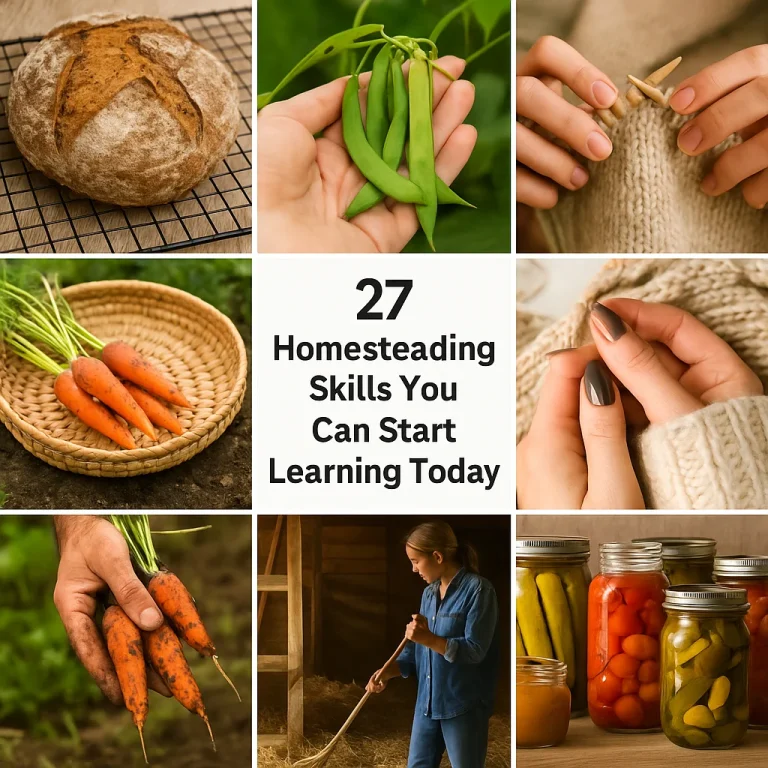Rediscover the Power of Self-Sufficiency—One Skill at a Time
In today’s fast-paced digital world, the satisfaction of creating something with your own hands often gets lost in the shuffle. But homesteading skills aren’t just a rustic fantasy—they’re practical, empowering tools that help you live with intention. Whether you’re in a city apartment or a countryside cabin, learning homesteading skills brings you closer to nature, reduces dependency on modern systems, and fosters true self-reliance.

This guide introduces 27 essential homesteading skills that you can start learning right now. From growing and preserving your own food to crafting natural remedies and repairing your home, these skills will help you lead a more grounded, sustainable life.
Why Learning Homesteading Skills Matters
Homesteading skills are more than survival tactics—they’re the foundation of a self-sufficient lifestyle. These skills:
- Help you save money and reduce waste
- Prepare you for emergencies
- Enhance your connection with food and nature
- Build confidence in your ability to thrive without reliance on consumer systems
- Encourage a slower, more meaningful way of life
And the best part? Anyone can start. No land, no farm animals, no special equipment—just the desire to learn and live differently.
Food Production & Gardening Skills
1. Starting Seeds Indoors
Mastering this homesteading skill allows you to grow your own vegetables from scratch, even in winter. Use small containers, soil, and a sunny window or grow light to germinate seeds indoors.
2. Composting Kitchen Scraps
Learn to turn banana peels, coffee grounds, and eggshells into rich soil. Composting is a fundamental homesteading practice that improves your garden and reduces waste.
3. Container Gardening
Don’t have space for a garden? Use pots and containers to grow herbs, leafy greens, or tomatoes on your balcony or porch. A great urban homesteading skill.
4. Building Raised Beds
With basic carpentry knowledge, you can construct raised beds for better drainage and soil control—key for successful vegetable gardening.
5. Saving Seeds
Saving seeds from your healthiest plants reduces dependency on seed companies and preserves heirloom varieties.
Food Preservation Skills
6. Canning
Canning is one of the most important homesteading skills. Learn water bath canning for jams and pickles, or pressure canning for beans and meats.
7. Dehydrating
Dehydrate fruit, vegetables, and herbs using a dehydrator or oven. This method saves space and locks in nutrients.
8. Fermenting
Ferment vegetables into sauerkraut or cucumbers into pickles. Fermentation supports gut health and is easy to start at home.
9. Freezing Smart
Learn the right way to prep and freeze foods so they last longer. Label, date, and rotate to reduce waste.
10. Vacuum Sealing
This method keeps dry goods and leftovers fresher, longer. Use it to store flour, rice, and cooked meals.
Cooking & Kitchen Homesteading Skills
11. Baking Bread from Scratch
Few homesteading skills are as satisfying as baking bread. Start with no-knead recipes, then try sourdough.
12. Making Yogurt and Cheese
Making dairy products at home lets you control ingredients, reduce packaging waste, and save money.
13. Rendering Animal Fat
Use tallow or lard from meat to create high-heat cooking oil or soap ingredients—nothing wasted.
14. Cooking Without Electricity
Practice outdoor or off-grid cooking over a fire or with solar cookers. This homesteading skill boosts resilience.
15. Crafting Herbal Remedies
Learn to create tinctures, teas, and salves using herbs like echinacea, chamomile, or calendula.
Handcrafting & Natural Living Skills
16. Sewing and Mending
Sewing and repairing clothing is a lost art and a crucial self-sufficiency skill. All you need is needle and thread to start.
17. Knitting or Crocheting
Make warm, practical items like scarves, dishcloths, or blankets from yarn. Great for winter months and gifting.
18. Soap Making
Create soap bars with oils, lye, and essential oils. Customize for skin type or scent preference.
19. Candle Making
Repurpose wax or use beeswax to create long-lasting candles. Learn to wick, scent, and mold.
20. Making Natural Cleaners
Combine vinegar, lemon, and baking soda for powerful, non-toxic cleaning solutions.
Home Maintenance & Survival Skills
21. Basic Carpentry
Learn to use a hammer, drill, and saw to build shelves, storage boxes, or cold frames.
22. Tool Sharpening
Dull tools are unsafe and inefficient. Sharpening is an underrated homesteading skill that improves productivity.
23. Rainwater Harvesting
Collect rainwater in barrels to water your garden. Check local laws and install filters for basic purification.
24. Solar Cooking
Use sunlight to cook meals without electricity. Invest in or build your own solar oven.
25. DIY Repairs
Learn to fix leaks, patch drywall, or caulk windows. Handy repair knowledge keeps your home functional and saves on costs.
Animal Care & Beekeeping Basics
26. Raising Backyard Chickens
Even in urban areas, you can keep hens for eggs. Learn about feed, coops, and seasonal care.
27. Beekeeping
Bees support your garden and provide honey and wax. Start small with one hive and take a beginner’s course.
👉 Want to take your homesteading to the next level? Explore practical off-grid skills, garden systems, food storage methods, and more in The Self-Sufficient Backyard.It’s a must-have resource for anyone serious about living sustainably.
Sample Projects Using Homesteading Skills
Here are a few beginner-friendly projects to apply your homesteading skills:
1. No-Knead Bread

– Practice baking with just flour, yeast, water, and salt. Let it rise overnight and bake in a Dutch oven.
2. Herbal Cough Syrup

– Combine honey, lemon, and thyme in a jar. Let steep and refrigerate. Take by the spoonful as needed.
3. Fermented Pickles

– Place sliced cucumbers in a jar with salt brine, garlic, and dill. Let sit at room temperature for a week.
4. Fire Cider

– Chop garlic, onion, ginger, and horseradish. Cover with vinegar, steep for 2–4 weeks, strain, and sweeten with honey.
🛠️ Recommended Resource for Aspiring Homesteaders
If you’re ready to truly embrace self-sufficiency, The Self-Sufficient Backyard offers a comprehensive blueprint for living off the land—even if you only have a small backyard. With step-by-step guides on food production, preservation, rainwater harvesting, and off-grid energy, it’s the ideal companion for every aspiring homesteader.
FAQ – Homesteading Skills for Beginners
Do I need land to learn homesteading skills?
Not at all. Many homesteading skills—like fermenting, sewing, breadmaking, and composting—can be learned in an apartment.
What’s the easiest homesteading skill to start with?
Try baking your own bread or growing herbs in a container. Simple, useful, and instantly rewarding.
Are these skills expensive to learn?
Most homesteading skills require minimal investment and save money long-term.
Can kids learn homesteading skills too?
Absolutely. Children enjoy gardening, baking, sewing, and making homemade goods.
Where can I learn more homesteading skills?
Check YouTube channels, local workshops, and blogs. Community gardens and online forums are also great resources.
Conclusion – Start Building Your Homesteading Skills Today
Now that you know how to grow raspberries, why not go a step further? Click here to explore The Self-Sufficient Backyard and unlock the tools and systems to grow even more fresh food, reduce your reliance on grocery stores, and transform your outdoor space into a sustainable oasis.
Happy raspberry gardening!

